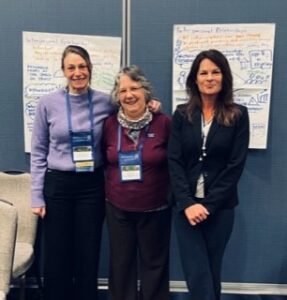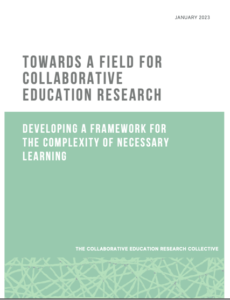Highlights from NYKids’ Conference Presentations on Leader-Researcher Collaboration
By Kristen C. Wilcox
We (Kristen and Aaron) were honored to have opportunities to represent NYKids and participate in two conferences between November 17th– 19th. The University Council for Educational Administration (UCEA) annual convention was held in Minneapolis, Minnesota and the American Anthropological Association annual meeting was held in Toronto. While different organizations and with different foci and targeted participants, major themes discussed at both conferences were the need for researchers and practicing professionals to address systemic issues of oppression and commit to engaging in research that honors local knowledge and expertise. In this blog, as part of a two-part series, we share highlights from the UCEA conference.
Collaborative Efforts between Leaders and Researchers
This year’s UCEA convention theme was: A Call to Action: Imagining a Hard Reset in Educational Leadership. Drawing on researcher Ladson-Billings’ plea, the convention called on educational researchers and leaders to…
“move away from oppressive policies and practices by partnering and centering cultures of our students and youth, parents, and communities we serve”.

At UCEA, I (Kristen) was honored to act as a co-facilitator with fellow University at Albany Educational Policy and Leadership faculty member Kathryn Schiller in a critical conversation entitled “Collaborative Efforts between Leaders and Researchers to Support the Hard Reset that Educational Systems Require”. Members of the Collaborative Education Research Collective helped bring together educators and scholars for discussions over several months leading up to this critical conversation. The underlying premise of the critical conversation was:
Educational leaders and researchers have a responsibility to collaborate on finding solutions to the long-standing racial injustice and oppression within educational systems and beyond.
The critical conversation centered on a newly-released, and Hewlett Foundation-funded, white paper entitled: Towards a Field for Collaborative Education Research: Developing a Framework for the Complexity of Necessary Learning.
This white paper offers a “Framework for the Necessary Learning for Collaborative Education Research” including the following propositions:
- Systems Landscape Educational research is embedded in social, cultural, historical, political contexts.
- Interpersonal Relationships All collaborators can and should be positioned positively and powerfully through attention to roles and relationships.
- Intrapersonal Relationships Individuals can and should reflect on how they perpetuate power differences as they “show up” for the work.
- Resource Mobilization Human, financial, and material assets can and should be leveraged to create more equitable education systems.
- Educational Research Research and evidence can and should be adaptive and responsive to local needs.
In small groups organized by the above categories, the critical conversations were guided by the prompt: Where have you and your organization(s) succeeded or struggled to enact and support the learning necessary for collaborative research that could contribute to the hard reset in education systems?
In my group, participants focused on resource mobilization and the discussion yielded a number of take-aways regarding the what, who, and how of resource mobilization for researcher-leader collaboration.
 What resources are needed to support collaboration?
What resources are needed to support collaboration?
Financial resources such as grants, are essential when no other funding is available, yet relying on grants that typically have fairly short timelines, are limited in helping sustain partnerships. Our group also discussed growing opportunities to offer professional development opportunities to partners, which can generate much-needed funds while serving collaborators’ needs.
Who is needed to support collaborative efforts?
Human resources were also a large part of the discussion and specifically our group focused on how collaborations require different committed individuals inside and outside the academy to take on a number of essential roles. These include “service faculty” who engage directly with practicing professionals, university administrators who provide support for crafting and implementing contracts and Memorandums of Understanding (MOUs) with partners, and directors of partnerships who help communicate with diverse stakeholder groups, garner funding, and provide leadership for teams of collaborators.
How can collaborative efforts be supported?
A lingering “come back to” question for our group was: How can universities support leader-researcher collaboration? In this regard our group landed on the need to encourage entrepreneurial efforts to generate funds for collaborations and be purposeful about building knowledge and expertise among collaborators to take on the diverse roles discussed above. Summing up the take-aways, our group concurred that while many “material” resources are available (e.g. protocols) for collaborators, the financial and human resource infrastructure for optimal development and use of collaborations to support improvements across the education pipeline is in need of concerted attention if it is to contribute to the “hard reset”.
From a NYKids perspective – we are incredibly fortunate to have sustained funding from the State of New York as well as the University at Albany and our advisory board partners who all support our collaborations and dissemination of our research. In this way, NYKids functions as a “lighthouse” for other states working to develop sustainable collaborations between leaders and researchers.
A most pressing need indicated by NYKids Advisory Board for NYKids to fulfill its mission is for readers’ and collaborators’ to continue to share NYKids’ resources. To this end, please consider signing up for our Newsletter if not done so already, share our resources widely with your networks, and reach out to us if you would like NYKids staff to offer
- virtual or in-person workshops on our performance tracker or other research
- connections to peer organizations in the state with shared problems of practice
- direct school improvement or research support
As always, we welcome all your questions or feedback at nykids@albany.edu, and please follow us on Facebook, X, Instagram, and LinkedIn.
